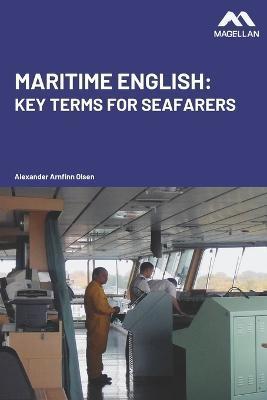Maritime English: Key Terms for Seafarers

Maritime English: Key Terms for Seafarers
In an industry that boasts a strong international presence, it is essential to have a common language that everyone on board ship can understand and communicate in.
Maritime English, also known as Standard Maritime Communication Phrases (SMCP), is the lingua franca at sea so to speak, and is vitally important for a multitude of reasons such as the safety of the crew, the efficiency of daily tasks and the integrity of the ship. By having specific terms to follow, Maritime English rules out any confusion that would arise if normal terms that are used in day-to-day life were to be uttered. For instance, left and right can be rather ambiguous demands for direction, if the captain and a crew member are at different areas of the ship.
Maritime English's main purpose is to serve as a manifestation of foundation English along with unique phrases to allow ship to ship communication, ship to shore communication and internal communications on board ship.
Here are some examples of Maritime English terms for positions on a boat:
Front of ship - bow/fore
Propeller region - oft/stern
Region in between the oft and bow - midship
Left hand side of vessel - Port
Right hand side of vessel - Starboard
Ship levels - decks
Base of ship - keel
Where captains/officers operate - bridge
This can understandably be challenging for beginners; some nuances will be harder to retain than others but more senior members of the crew will give a run through of various situations before they happen in reality. To make things clearer, not just for novices but for all members of the crew, on what is most likely a manic, high pressure vessel, message markers are used as prefixes for statements.
Once mastered, Maritime English is a wonderfully efficient way to conduct one's self on a ship, from altering English, words and phrases to creating a code language for hazardous situations, this skill will serve you well at sea.
PRP: 229.71 Lei
Acesta este Prețul Recomandat de Producător. Prețul de vânzare al produsului este afișat mai jos.
206.74Lei
206.74Lei
229.71 LeiIndisponibil
Descrierea produsului
In an industry that boasts a strong international presence, it is essential to have a common language that everyone on board ship can understand and communicate in.
Maritime English, also known as Standard Maritime Communication Phrases (SMCP), is the lingua franca at sea so to speak, and is vitally important for a multitude of reasons such as the safety of the crew, the efficiency of daily tasks and the integrity of the ship. By having specific terms to follow, Maritime English rules out any confusion that would arise if normal terms that are used in day-to-day life were to be uttered. For instance, left and right can be rather ambiguous demands for direction, if the captain and a crew member are at different areas of the ship.
Maritime English's main purpose is to serve as a manifestation of foundation English along with unique phrases to allow ship to ship communication, ship to shore communication and internal communications on board ship.
Here are some examples of Maritime English terms for positions on a boat:
Front of ship - bow/fore
Propeller region - oft/stern
Region in between the oft and bow - midship
Left hand side of vessel - Port
Right hand side of vessel - Starboard
Ship levels - decks
Base of ship - keel
Where captains/officers operate - bridge
This can understandably be challenging for beginners; some nuances will be harder to retain than others but more senior members of the crew will give a run through of various situations before they happen in reality. To make things clearer, not just for novices but for all members of the crew, on what is most likely a manic, high pressure vessel, message markers are used as prefixes for statements.
Once mastered, Maritime English is a wonderfully efficient way to conduct one's self on a ship, from altering English, words and phrases to creating a code language for hazardous situations, this skill will serve you well at sea.
Detaliile produsului











